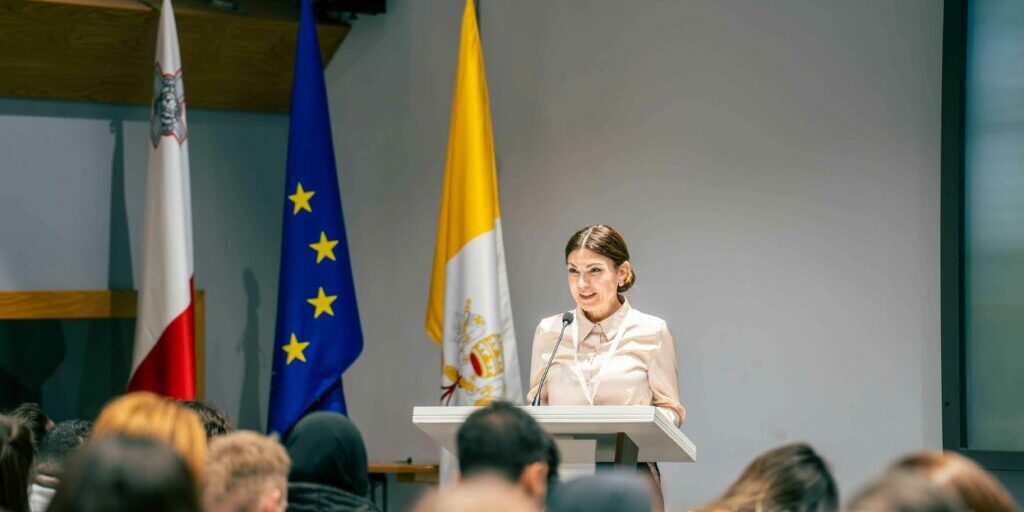“What happens when silence has a price?”

Omertà
-Silence and being silenced-
Maria Brown, Ph.D.
Opening address delivered at the
Archives of the Mediterranean Ethnographic Laboratory (MELA)
Conference
Women in the Mediterranean
April 27, 2025
Mediterranean Conference Centre, Malta
Opening
What happens when silence comes at a price?
And that price is your safety, the safety of your loved ones,
Banishment or dishonor?
Welcome to the quiet history of omertà in the Mediterranean.
A story of silence, and being silenced.
A silent, thousand-year-old cry,
with gender dimensions,
intersecting conquest, exploitation,
oppressive patriarchy, colonization,
and today's post-colonial and oppressive legacies,
which are made more complex by new challenges such as
climate change, surveillance societies, and radicalization, among others.
The Mediterranean and Malta can be a hall of mirrors
which distorts humanity and femininity.
Thus, the Mediterranean – the cradle of civilization –
manifests an autoimmune collateral.
Through these legacies and dynamics,
Silence is not cowardice.
Dynamics and impacts of the Omerta in the Mediterranean
Colonization did not simply redraw borders;
She reconnected dignity.
She taught entire societies—and especially women—
This silence was a virtue.
As Nawal El Saadawi (1975, 1983), Egyptian feminist
revolutionary, recounts in his novel, Woman at Point Zero:
"You are a wild and dangerous woman."
And the truth is wild and dangerous (pp. 109-110).
Across the Mediterranean today, the omertà is mutating in several ways.
Here we will focus on the following three themes:
– Gender-based violence and underreporting
– Political and economic underrepresentation
– Cultural silence through tradition through these gendered mutations, silence and silence persist.
Can they end?
The Data: The Justification of the Silent Scream.
Gender-based violence and underreporting: – Around 31% of women aged 18-74 in the EU have experienced
physical violence, sexual violence or threats as an adult.
Only about 14% of these women report such incidents to the police.
(European Union Agency for Fundamental Rights, European Institute
for Gender Equality, & Eurostat, 2024). – Stigma, shame and fear actively discourage gender reporting
violence (Shaibakova, 2020).
– Femicide remains underreported (United Nations Office
on Drugs and Crime (UNODC) & UN Women, 2023), with initiatives such as
The European Observatory on Femicide begins to systematically
follow.
Political and economic underrepresentation
(International Labour Organization, 2025). – Globally, 26.9 % of parliamentary seats are held by
Women (Inter-Parliamentary Union, 2024, p. 14). – In Malta, until 2021, only 13.4% of parliamentary seats were held by women (IPU, 2019).
The recent reform of gender balance in Parliament has increased the representation of the underrepresented sex in Parliament.
The implemented version of the reform shifted the burden from the political class to voters and taxpayers.
Cultural silencing through tradition: – 65% of women cite traditional gender norms as limiting their audience (Euro-Mediterranean Women's Foundation, 2019).
The intersections with education levels are nuanced and non-linear.
It should not be assumed that women with higher education are not silenced.
In a recent study I co-produced early in my career, European researchers tell stories of precarity and abuse (Külcür et al., 2024).
An experience that these research participants shared with us.
I have noticed that there is a tendency to value men
voices and opinions more than those of women… it is obvious that the
The system is still in favor of masculine ideas… (p. 18).
…you have to struggle daily as a young female researcher.
'Adult' male researchers treat you like you're a little thing, tell me what you did with your research'… (p. 19).
In a recent study by Cutajar & Vassallo (2024),
The University of Malta students said:
You expect it (regarding sexual and gender issues)
harassment and, more specifically, groping and inappropriate touching) –
It's not necessarily correct, but at the same time, I've gotten used to it (p.
114).
My vision: reforms are necessary.
Internationally, nationally and globally
It is time we committed to international, national and local reforms.
At the international and national levels, countries must commit to: – a Mediterranean charter on women's freedom of expression; – audits of the impact of gender on cultural and educational policies; and – protections for whistleblowers.
At the local level, let's talk about local reforms and initiatives.
Let's talk about women's public archives, storytelling projects and
Creative expression programs.
The Call to Action: Beautiful Hope and Beyond
In the future,
Can we capture the spirit of the Bel Espoir mission?
that connects you, young people,
between nationalities, cultures and religions (Bel Espoir, 2024),
the launch of a nautical observatory of the lives of women in the Mediterranean?
A nautical observatory with qualitative data collection routes;
in the form of life stories, photo journals, videos, travel diaries.
The Bel Espoir project and legacy could amplify the voices of women on the riverbanks, complementing important initiatives that are more focused on statistics and figures,
Like the European Observatory on Femicide (COST Action, 2024).
In the process, it would build capacity from trip to trip, from research group to research group.
In the Mediterranean and beyond,
we need to document not only the deaths and the number,
but also lives and life stories.
Not just statistics, but also travel!
Paths that transcend electoral cycles and partisan programs.
We need to talk about new horizons, routes, connections, and destinations.
In conclusion, my appeal is as follows:
Develop sustainably — and therefore equitably.
Speak with respect—and therefore, without apologies.
Rebuild boldly—and therefore without resentment.
THANK YOU!
.translated from English.
Published on May 5, 2025